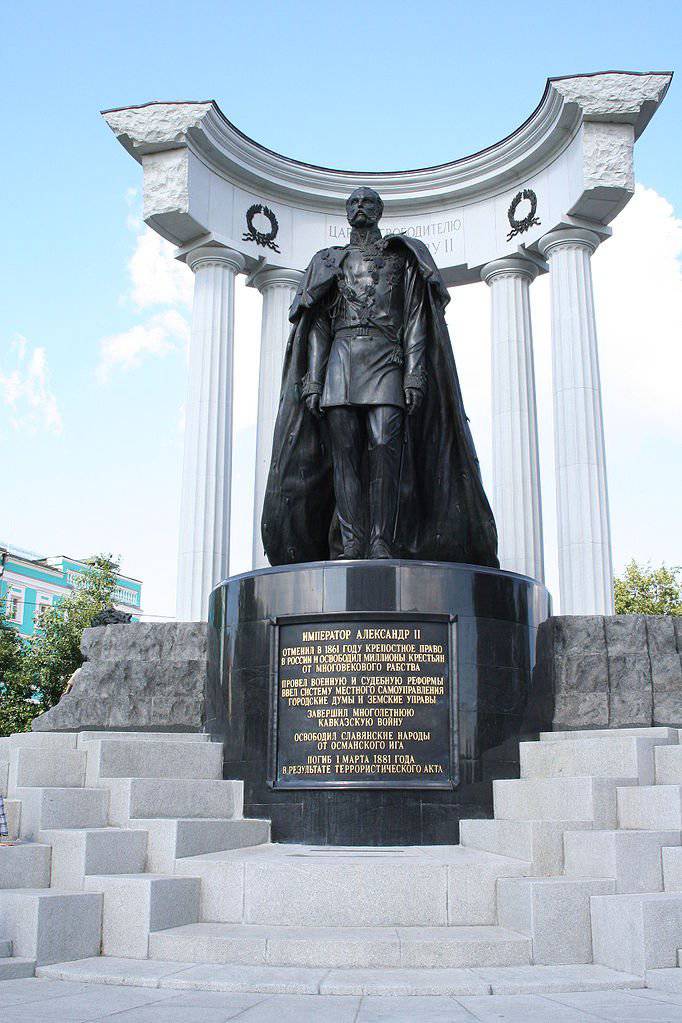The black myth of the "Russian slavery"

Continuing the theme of “black myths” about Russia, one cannot but dwell on the theme of “Russian slavery,” “downtroddenness,” “long-suffering” of the people. Let us analyze one of the most powerful pillars of this myth - “serfdom”. In 2005, a monument to Emperor Alexander II was unveiled in Moscow, and the following words were inscribed on it: “Canceled serfdom in 1861, and freed millions of peasants from centuries of slavery.”
The idea of “centuries of slavery” is at least a mistake, or rather, misinformation. First, serfdom was a system that ensured national security, the independence of the country. Russia-Russia lived in the conditions of constant wars, one external aggression followed another. The reflection of enemy invasions led to the need for huge military expenditures, which the state treasury could not draw by itself. As a result, a system was invented, when part of the population pulled the strap of the sovereign service (military), while another part carried the burden - fed the landowners and supported the state with the product of their labor. In fact, the peasantry contained landowners, and the nobles served the state, were obliged to perform military service, shed blood and sweat at the first call of the Sovereign. In fact, the "serfs" (not completely free) were both landlords and peasants. Otherwise, in that period storiesIn the realities of constant external military aggression, neither the state, nor the landlords, nor the working people would survive. Serfdom in Russia was a necessary form of the existence of society in conditions of constant geopolitical tensions. It is possible that if Russia did not have to constantly repel the onslaught from the southeast and the west, it would not have arisen at all.
Moreover, the repression for refusal of service was quite tough. Tsar Peter I in general could deprive the nobleman of the estate. Up to 1754, noble youth were sent to ordinary soldiers or sailors for failure to appear on time for imperial military service. Thus, serfdom in Russia was not slavery in the full sense of the word, when a person from one part of society is a property, a “talking instrument” of a representative of another part of society. There have been cases when noblemen were punished for killing or injuring peasants.
Secondly, in Russia there was no “centuries-old slavery”, the classic serfdom that we know from the Russian literature of the 19 century, appeared only in the 1762 year. This year, the Manifesto on the Freedom of the Nobility (“On the granting of freedom and freedom to the whole Russian nobility”) was issued. Peter III signed him during his short reign and approved Catherine II in 1785 - “Letters to the nobility of 1785”. According to this law, for the first time in the history of Russia, the nobility was exempted from compulsory 25-year civil or military service, could resign before the end of this term and freely go abroad. Only one restriction was left - the nobles were obliged to serve in the armed forces during the wars, for which they had to return to the Russian Empire under the threat of confiscation of land holdings. It was from this time that serfdom lost its significance, since the nobles were freed from service to the state, but there were no serfs. Some of the nobles became parasitic on the peasants and the state class (part, because others honestly carried the strap of the state service).
As a result, serfdom as a backward relic lasted less than a hundred years (1762-1861 years).
Thirdly, it is impossible not to say about the tendentiousness of Soviet historiography, which in speaking of the "accursed tsarism" in every way exaggerated. In addition, the percentage of serfs in the 19 century steadily declined (a particularly strong decline occurred during the reign of Nicholas). So, by the 10 revision of 1858, the share of serfs in the entire population of the Russian Empire fell to 37%. In a number of lands, there were no serfs at all - in Estland, Kurland, Livonia (Ostsee provinces), in the Land of the Black Sea Army, in the Primorsk region, Semipalatinsk and Siberian Kirgiz regions, in the Derbent province (with the Pre-Caspian region), in Erivan, Arkhangelsk and Chemmen. provinces, Trans-Baikal and Yakutsk regions. In many provinces, the percentage of serfs was very small.
As already mentioned, the serfs were not "speaking instruments." This is evidenced by the fact that there is a group of “serf millionaires” - the peasants were richer than their masters.
Fourth, representatives of the West should not blame Russia for “slavery”. Representatives of the "enlightened Europe" for several centuries without remorse used real, classical slavery, when people were turned into "movable property". Entire nationalities and tribes in America and Africa were turned into slaves, wild hunts were organized on people, and millions and millions of people were killed by Europeans in the process of capturing and transporting “live goods”. Other millions were tortured, starved to death by hard labor and hunger on the plantations. In Russia, this has never happened. Slavery was contrary to the deepest qualities of the Russian character.
Concluding the article, we can recall dozens of Russian riots, uprisings, peasant wars, with which the population responded to "excesses" by the management corps. It should be noted, and the fact that the "slaves" would never have began to protect the "slave owners" and the slave-owning state. The Russian people more than once showed their Will to resist and independence under the conditions of the most violent invasions.
Information